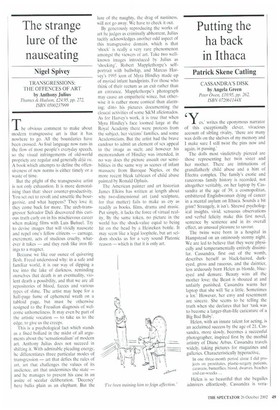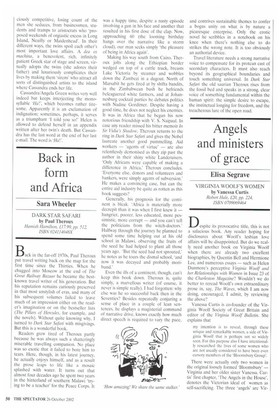Putting the ha back in Ithaca
Patrick Skene Catling
CASSANDRA'S DISK by Angela Green Peter Owen, £10.95, pp. 262. ISBN 072061144X
Yes,' writes the eponymous narrator of this exceptionally clever, vivacious account of sibling rivalry, 'there are many wax dolls on the shelves of my memory and I make sure I still twist the pins now and again, in passing.'
The dolls most vindictively pierced are those representing her twin sister and her mother. There are intimations of grandfatherly child abuse and a hint of Electra complex. The family's exotic and rancorous family history is recorded, not altogether veritably, on her laptop by Cassandra at the age of 39, a cosmopolitan, embittered Englishwoman dying of cancer in a mental asylum on Ithaca. Sounds a bit grim? Strangely, it isn't. Shrewd psychological insights, vivid, sensuous observations and verbal felicity make this first novel, sentence by sentence and in its overall effect, an unusual pleasure to savour.
The twins were born in a hospital in Hampstead on an ominously stormy night. We are led to believe that they were physically and temperamentally entirely dissimilar. Cassandra, first out of the womb, describes herself as black-haired, darkeyed, gross and raucous, and the daintier, less arduously born Helen as blonde, blueeyed and demure. Beauty wins all the mother love; the Beast is shouted at and unfairly punished. Cassandra warns her laptop that she will lie a little. Sometimes a lot.' However, her envy and resentment are sincere. She seems to be telling the truth when she declares that her 'task was to become a larger-than-life caricature of a Big Bad Baby'.
Helen, with an innate talent for acting, is an acclaimed success by the age of 21. Cassandra, more slowly, becomes a successful photographer, inspired first by the morbid artistry of Diane Arbus. Cassandra travels widely, taking pictures for magazines and galleries. Characteristically hyperactive,
In one three-month period alone I did projects on prostitutes, plastic-surgery patients, caravans, butterflies, blood, dwarves, beaches and car-wrecks ...
Helen is so beautiful that she beguiles admirers effortlessly. Cassandra is vora
ciously competitive, losing count of the men she seduces, from businessmen, students and tramps to aristocrats who 'proposed weekends of orgiastic excess in Long Island, Neuilly or Maidenhead'. In their different ways, the twins spoil each other's most important love affairs. A dea ex machina, a benevolent, rich, infinitely patient Greek star of stage and screen, virtually adopts the twins (she adores their father) and luxuriously complicates their lives by making them 'sirens' who attract all sorts of distinguished artists to the island where Cassandra ends her life.
Cassandra/Angela Green writes very well indeed but keeps interjecting the monosyllable 'Har , which becomes rather tiresome. Apparently it is an exclamation of indignation; sometimes, perhaps, it serves as a triumphant 'I told you so!' Helen is allowed to defend herself in an appendix written after her twin's death. But Cassandra has the last word at the end of her last e-mail. The word is 'Hal.



















































































 Previous page
Previous page